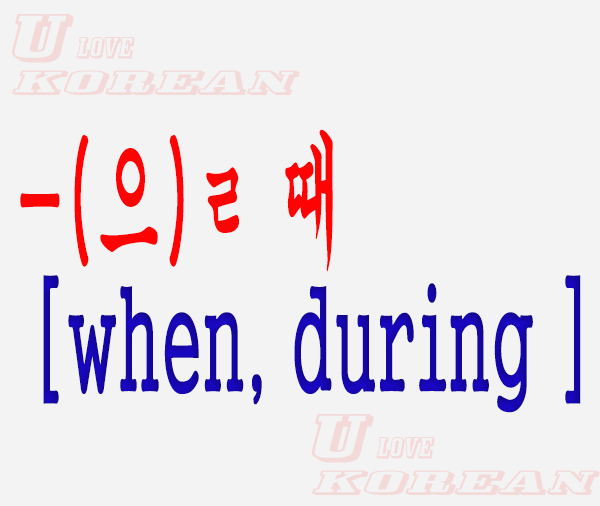-(으)ㄹ 때=when, during
05.09.2023 | You Love Korean | 0 Comments

1. -(으)ㄹ 때 is attached to a verb, an adjective, 'noun+olr|', indicating a period of time
when something or a situation continues or the moment when something happens.
가: 시간이 있을 때 뭘 해요?
- What you have time, what do you do?
- What you have time, what do you do?
나: 시간이 있을 때 영화를 봐요.
- When I have time, I watch movie.
- When I have time, I watch movie.
2. Even if the event happened in the past,
the expressions -았/었/였 are not used in front of -(으)ㄹ 때 and the
tense is shown at the end of a sentence instead. However,
if the event has been completed in the past, -았/었/였 can be used.
집에 올 때 비가 와서 우산을 샀어요.
- When I come home, I bought an umbrella since it rained.
- When I come home, I bought an umbrella since it rained.
집에 다 왔을 때 비가 와서 우산을 필요없었어요.
- The umbrella wasn't neccssary since it started to rain when we almost got home.
- The umbrella wasn't neccssary since it started to rain when we almost got home.
3. This takes two form of verb.
a. If the stem ends in a vowele or ㄹ, -ㄹ 때는 is used
가: 학교에 올 때 뭐 타고 와요?
- What do you ride to school?
- What do you ride to school?
나: 버스를 타고 와요.
- Take the bus.
b. If the stem ends in a consonant other the ㄹ, -을 때 is used
- Take the bus.
가: 시간이 있을 때 무엇을 해요?
- What do you do when you have time?
- What do you do when you have time?
나: 저는 그림 그리는 것을 좋아해요. 그래서 시간이 있을 때는 그림을 그려요.
- I like to draw pictures. So I draw when I have time.
- I like to draw pictures. So I draw when I have time.
가: 수미 씨한테 언제 전화가 왔어요?
- When did Sumi call you?
- When did Sumi call you?
나: 집에서 쉬고 있을 때 전화가 왔어요.
- I got a call when I was resting at home.
- I got a call when I was resting at home.
4. N + 때:
가: 식당에 사람이 많아요?
- Are there a lot of people in the restaurant?
- Are there a lot of people in the restaurant?
나: 아니요. 제가 갔을 때는 사람이 변로 없었어요.
- No, when I went there, there was no one.
- No, when I went there, there was no one.
가: 세준하고 언제 처음 만났어요?
- When did you first meet Sejun?
- When did you first meet Sejun?
나: 초등학교 때 만났어요.
- We met in elementary school.
- We met in elementary school.
